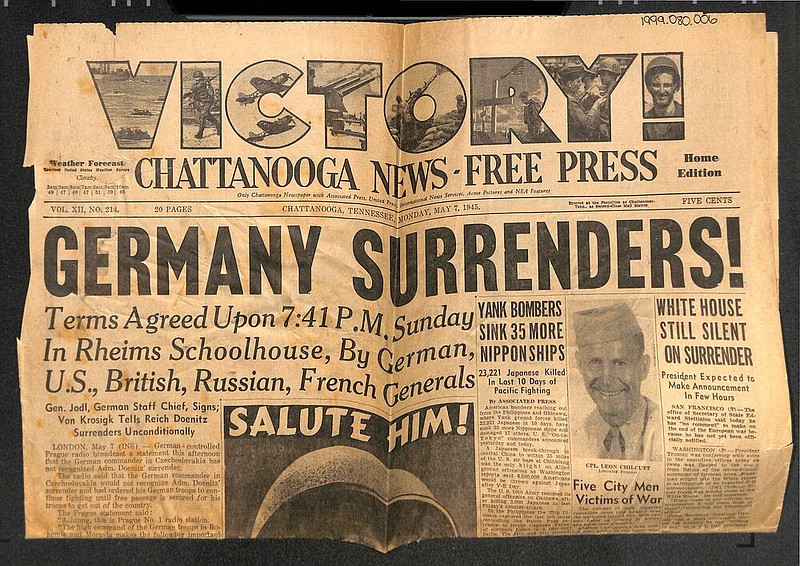During recent weeks, this column has focused on the men and women who have served in our nation's armed forces and their legacy during World War II.
Victory in Europe arrived on May 7, 1945, after 4-plus years of U.S. troop involvement, when the supreme commander of Allied forces, Gen. Dwight Eisenhower, received the Nazi's government's unconditional surrender during a ceremony in Reims, France. Fighting in the Pacific theater continued until three months later when the Japanese government announced its unconditional surrender on Aug. 14, followed by a formal surrender aboard the U.S.S. Missouri, anchored in Tokyo Bay, on Sept. 2, 1945.
As the Tennessee Valley prepared for Christmas in 1945, local families found their holiday traditions mingling with the lingering sadness of the war and the excitement of returning family members. More than 315,000 Tennesseans had served as soldiers, sailors, airmen and Marines, a number that comprised almost 11% of Tennessee's total population in 1941, and 5,731 had lost their lives, including 660 Hamilton County residents.
Camp Forrest, in neighboring Coffee County, had served as an induction and infantry training center. Here in Chattanooga, we often forget the largest inland naval base, the 3,800-acre Naval Air Station, was just across the state in Millington. Many Tennessee servicemen were inducted at Fort Oglethorpe during the initial days, and Tennessee women who joined the Women's Army Corps, along with women from other regions of the nation, trained there.
Additionally, Tennessee government had encouraged civilian women to replace men in the war production industries and, in 1942, the U.S. Congress's Lanham Act authorized additional funds for wartime child care centers. Hamilton County leaders seized this opportunity to create one of the four Lanham-funded Tennessee centers here in Chattanooga. Across the state, women's employment increased by almost 85,000 and, while many were replaced by returning troops in 1945, Tennessee women's 1950 employment numbers had increased by 23,000 over the 1940 employment data.
Local residents who remember the celebrations for returning troops, who worked in local industries packing rations or nurturing Victory gardens or collected pennies to support the troops, have stories that need to be preserved for future generations. During a difficult year, imagine the excitement for young students or the adults among us as individuals help create oral histories for those who remember the struggles and glorious victories of World War II. Whether one is celebrating alongside a beloved great-grandfather or grandmother or uses creative technological options for recording voice or video, this holiday season could be the time when families come together to recount and preserve the stories that enrich our family and community histories. Just think about it: You can begin a bright new year 2021 by looking backwards with intentionality.
How does one begin? First, consider what you know about your family member's history. Did he serve in the military in Europe, North Africa, the Pacific or some other strategic location? Did she work in a local industry? Think about the questions you would like to ask, always keeping in mind that it is your family member's story and the interview may go in a direction that you cannot anticipate.
Test your recording methodology before the interview. If you're lucky enough to be a part of your interviewee's safe cohort and can conduct the interview in person, choose a comfortable and quiet location. Create a list of questions, but be willing to follow your interviewee's lead. Ask if there are photographs that help tell the story.
What questions might you ask? For veterans, consider beginning with these questions: Were you drafted or did you enlist? Tell me about boot camp and basic training. Were you able to write home? What was your job? Is there one day that you always think about when you remember your service? Who were your closest friends and did you stay in contact after the war? Did you save any letters? For civilians, you might ask about how the war impacted family life. What are your most vivid memories? How aware were you of the military's major battles and movements? Do you remember hearing about D-Day? V-J Day? Ask each interviewee how his/her childhood was different from today's experiences. Allow your family member to freely reminisce; you'll capture treasures that future generations will enjoy.
2020 may be the year that you become a historian.
Linda Moss Mines, the Chattanooga and Hamilton County historian, is regent, Chief John Ross Chapter, NSDAR, and spent 45 years as a U.S. history and government teacher.
